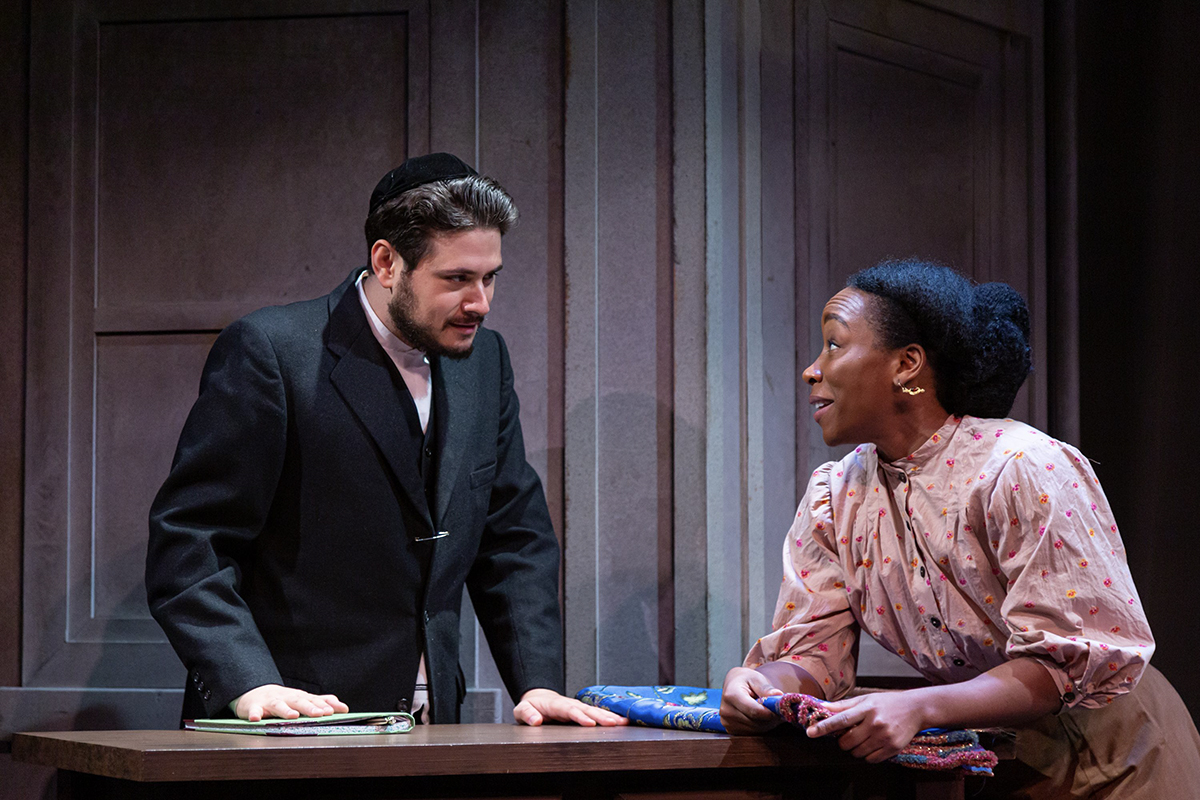‘Intimate Apparel’ Review: Lovers in Lace
Theater J's finely-stitched 'Intimate Apparel' fashions a touching drama from silk, sex, ambition, and forbidden romance.

Dressmakers make such rich subjects for storytelling. They translate our sheer necessity for clothes into meaning, and give visions a form we can feel, in every sense of the word.
In Paige Hernandez’s splendid staging of Intimate Apparel (★★★★☆) at Theater J, a lovingly sewn jacket of embroidered Japanese silk might bespeak a joyful wife’s hopes for a bountiful future with her new husband. Or, the same item of clothing might reveal the couple’s future together is in peril.
The play, by two-time Pulitzer Prize-winner Lynn Nottage, rises and falls with the modest aspirations of Esther, a 30-something Black seamstress living and working in Manhattan’s Lower East Side in 1905. She sews the exquisite aforementioned jacket from fine fabric bought from Mr. Marks, an Orthodox Jewish fabric merchant, with whom she shares a sweetly amiable, strictly platonic rapport.
As Esther and Marks, Renee Elizabeth Wilson and Yoni Bronstein summon a bubbly atmosphere of unspoken attraction based on mutual respect. Esther’s visits to Marks’ shop brighten her long days of toil, and clearly delight him, too.
But their acquaintance can’t progress beyond his fabric counter. They can’t be friends outside the shop, or even touch when they’re alone inside the shop. His religion forbids it, as Esther learns in one beautifully played scene.
Laced with vivid historical detail, Intimate Apparel casts an insightful view at what a woman of Esther’s race and station could or couldn’t do with her life in turn-of-the-century New York. She came to the city from North Carolina at 17, chasing opportunity among a wave of Black folks moving up North.
The play extends its empathy for those women to include Esther’s landlady, Mrs. Dickson (Aakhu TuahNera Freeman), who married into her livelihood, and dear friend Mayme (an effervescent Awa Sal Secka), who just happens to be a prostitute.
Mayme came to New York to make music. Her bed is where she earns her money, but she still keeps a piano in her room — providing a welcome opportunity for musical theater fave Secka to sing a brief but swingin’ rag. Meanwhile, Esther harbors dreams of opening her own beauty parlor, for which she’s tucked away years of her earnings as startup funds, sewn into a quilt for safe keeping.
Nottage’s absorbing narrative stitches together plot elements like the money, the quilt, and the silk embroidered jacket adroitly, if none too subtly.
Hernandez’s production realizes those elements with gorgeously tactile costumes by Moyenda Kulemeka, props by Pamela Weiner, and scenic design by Paige Hathaway that, with pointed shifts in the lighting by Harold F. Burgess II, fits Mr. Marks’ fabric shop onstage alongside Mrs. Dickson’s rooming house.
Commanding his own platform, upstage from Esther’s humdrum life, is George, a stranger who might be the man of her dreams. Working as a laborer on the Panama Canal, and portrayed with roguish charm by Manu Kumasi, he courts Esther in enticing letters she has to have read to her. She can’t read or write.
Yet the play doesn’t judge her by her limitations, and treats working girl Mayme fairly, too. Apparel upholds the value of their friendship. It’s more cautious about the affinity Esther shares with her client, Mrs. Van Buren, a white woman whose interest in Esther might not be just platonic.
Susan Lynskey brings a ripe sense of longing to the character, and she and Wilson build persuasively to a sudden turning point in the ladies’ complicated relationship.
However, the turning point that truly ignites drama in the play’s second half is George’s arrival in New York from Panama. In the flesh, he’s still dreamy, but his manner differs from the sweet lover whose words so melted Esther’s heart.
George’s heel turn sends the story racing predictably towards heartbreak, but the graceful climax still connects, as do Wilson’s and Bronstein’s shining performances throughout.
Even overcoming minor onstage hiccups on press night — from a bed that wouldn’t sit still, to a few missed lines — Wilson and company captured the play’s poignancy and purpose. Despite any imperfections, the final fit was warm and inspiring.
Intimate Apparel runs through Nov. 13 at Theater J, 1529 16th St. NW. Tickets are $39 to $85. Call 202-777-3210 or visit www.theaterj.org.
Support Metro Weekly’s Journalism
These are challenging times for news organizations. And yet it’s crucial we stay active and provide vital resources and information to both our local readers and the world. So won’t you please take a moment and consider supporting Metro Weekly with a membership? For as little as $5 a month, you can help ensure Metro Weekly magazine and MetroWeekly.com remain free, viable resources as we provide the best, most diverse, culturally-resonant LGBTQ coverage in both the D.C. region and around the world. Memberships come with exclusive perks and discounts, your own personal digital delivery of each week’s magazine (and an archive), access to our Member's Lounge when it launches this fall, and exclusive members-only items like Metro Weekly Membership Mugs and Tote Bags! Check out all our membership levels here and please join us today!
























You must be logged in to post a comment.